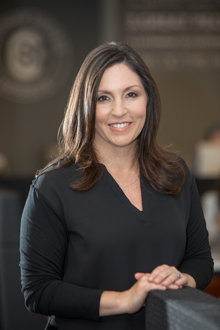Published on September 17th, 2020
By Megan Eales Monroe
In the first episode of The Top Floor, we take an in-depth look at executive leadership in property management and community associations.
We talk with a range of leaders, from Donald Davidoff (D2 Demand Solutions), Cindy Clare (Bell Partners, IREM, NAA), Ursula Burgess (Rees Broome, P.C. & CAI), and Aimee Miller (AppFolio). They provide an inside look at how organizations are leveraging their leaders to keep teams aligned, even during the most uncertain times.
In this episode, you’ll also hear:
- The defining traits of an effective executive leader
- The role technology plays in helping leaders meet new and unique challenges
- The tools needed to set future leaders up for success
Listen Now:
Episode Transcript
Narrator: Leadership styles vary from person-to-person, but no matter the industry, the same characteristics come up time and time again when discussing the qualities of an effective leader. According to Donald Davidoff, the President of D2 Demand Solutions, there are five key attributes that can describe C-suite executives.
Donald Davidoff: Decisiveness, openness, opportunity, optimism, and of course, integrity. These are all core ideals for leadership.
Narrator: A great leader also regularly evaluates what processes are in place and determines if they are working.
Donald Davidoff: One of the things that I’ve always believed about strategy and leadership is that, it’s not just about what we should do. What we keep adding and adding and adding, but what should we stop doing? It’s often what you say no to, or what you stop doing, that is important in that it frees up your bandwidth. It frees up capability and time, to do bigger and better things.
Narrator: While these key adjectives describe leaders across industries, there are certain tactics and skills that property management and community associations executives especially need in their roles.
Cindy Clare: I would say first and foremost, you need to be a good listener. So that you hear from your teams as well as from your clients, from your investors, from your owners, and understand the goals of what you’re doing for the management company. Secondly, I would say you need to be a multitasker. You need to be able to manage multiple things because there is always something going on. And I think that’s true in multifamily, regardless of the role you’re in, whether that’s a leadership role or down on a site level, you have to be a multitasker.
Narrator: That’s Cindy Clare, the Chief Operating Officer for Bell Partners, an instructor for IREM, and a past NAA chairman.
Narrator: Like most industries, the property management and community associations sectors have been disrupted in 2020. Now, during COVID-19, executive leaders play a unique role.
Donald Davidoff: When the fears about the future are so much larger than normal, our team, our colleagues and subordinates, et cetera, they’re looking at us to provide that confidence, to provide some insights, to be a rock towards the future. And that really means we need to think about how present we’re going to be. Not just what do we want to do, but what do we want to be? What do we need to be, for our team members and for ourselves?
Narrator: But that’s a great burden for just one person to carry. Davidoff recommends relying on others for help.
Donald Davidoff: Yes, leadership matters, but it also takes a community. It takes a village, to be successful.
Donald Davidoff: Just realizing that we’re each not alone, in what we’re going through is really, really critical to surviving it, and to accelerating through this curve. “How can I better depend on my team?” I’ve looked at where my time is spent, I’ve looked at where my team’s time is spent. “How can I better depend on them? How can I give them opportunities, that maybe they wouldn’t have otherwise had, and thereby strengthen the overall culture of the organization?” And really encourage others to model this, “Don’t go it alone,” behavior.
Narrator: As new challenges arise, leaders need to adapt to better manage their teams. Leveraging technology is a great way to stay ahead of evolving needs. That may be easier said than done. With constant changes to the way we work, it means there will inevitably be a learning curve. Let’s hear from Ursula Burgess, the current president of the Community Associations Institute.
Ursula Burgess: The problem with technology, obviously of course, is the fact that we have to learn it. And that’s also been a little scary, I think for some of us, who are a little on the older side, to adapt to technology, as opposed to the good old-fashioned write it on a piece of paper and put it in an envelope.
Cindy Clare: The thing we have to be careful of is there’s so much data out there. How do we make sure we don’t get into a data paralysis where we’ve got so much data, we don’t know which way to go. So really narrowing down and focusing on what’s important to you and to your company and to your clients from an objective standpoint and a goal standpoint. And that’s going to be different for every group, but understanding that and narrowing your focus a little more, because I think the scattershot approach with technology is what can get us into trouble.
Narrator: Even though adapting to new technology takes time in the upfront, it will save time and improve efficiencies for leaders down the line. Here’s Cindy Clare again.
Cindy Clare: It gives them tools to be more efficient at their job and more effective at their job. So again, we may not need to add people versus just subtracting, but if they do their job better and they make the customer experience better, then ultimately performance is better at a property. The other thing that technology does for us is the data side of it, gives us tools to really dig down and figure out what is working and what’s not working. And so using that data to make meaningful decisions, I think is critical.
Narrator: Sometimes, addressing new challenges also means acknowledging when you don’t know something.
Ursula Burgess: Leaders are not particularly mindful of their own weaknesses. So for example, if you’ve got a manager who’s operating in a portfolio position, where he or she is overseeing a number of different communities and is working with the general manager, and that portfolio manager is having a hard time triaging his or her emails and getting communications out, the general manager’s going to see that. And the general manager is going to see that it’s acceptable for his or her mentor/supervisor to fail in that area and not work to improve it.
Narrator: It also means asking others to show you the way. Burgess knows all about this. CAI strives to make life easier for community associations through educational and networking opportunities.
Ursula Burgess: I really think that leaders need to take stock of themselves and what skills they are not strong with, and then ask for help, or ask for improvement on that. Because I feel like just assuming that you know everything and can do everything is a dangerous place for any of us to be, and we need to continue to focus on our evolution and growth.
Narrator: Clare also has thoughts on this:
Cindy Clare: I can learn as much from a leasing consultant today as I can from another COO, simply because the leasing consultant brings different experiences and they’re boots on the ground and I’m not anymore. And so understanding and learning the things that are out there. I don’t need to be an expert, but I need to have an understanding, whether that’s new technologies, whether that’s the way we’re leasing apartments, anything like that, making sure you’re learning.
Narrator: What may have worked before, won’t necessarily work now.
Donald Davidoff: Reevaluate everything you do. Just because it’s always been done this way, doesn’t mean it makes sense.
Cindy Clare: I think the biggest blind spot for leaders in the industry is, well, we’ve always done it this way. How many times do you hear well, we can’t change that we’ve always done it this way? I remember when revenue management started, I was like, there’s no way that’s going to work. And the reality is, it’s now a staple in our industry. So making sure that you’re willing to listen and even though we’ve always done it this way, there may be different ways to do it.
Narrator: That may be easier said than done. There will inevitably be blind spots. But Aimee Miller, the Chief Marketing Officer at AppFolio, says this is why it’s more important than ever before to invest in leadership.
Aimee Miller: So in responding rapidly to changing environments, I think a blind spot can be when you’re not dedicating enough time to invest in yourself as a leader, and to invest in bringing that right energy and focus to your teams.
Narrator: But times of chaos also tend to open the door for some of the greatest opportunities.
Aimee Miller: I think as much as these have been challenges for leaders, I think it’s also been a great opportunity for leaders to really step into leadership roles that require everybody to think a little bit differently. I think as we look ahead, these are the things to focus on, which is the need for adaptability. We all need to be flexible and make sure that we’re challenging our leadership style to accommodate the new way of staying connected.
Narrator: And of course, technology plays a key role in this:
Aimee Miller: And I think that’s a key factor that every company really needs to depend on, which is how can you leverage technology to help you focus on the things that matter the most in your business? Because technology truly allows you to free up time to focus on strategy customers, find yourself your own personal energy to bring the best energy you can to your team. So I think that’s something that we’re really working with our customers to make sure that they adopt and use every aspect of our technology, but every leader across the board should be considering how they leverage technology ensure that they have enough time in the day to do all the things that teams need and that are requirements to being a really good strong leader during this time.
Narrator: In addition to technologyIn order to accommodate this, the need for focused training and education is also greater than ever.
Aimee Miller: Every leader is as great as the team around them, and so being really thoughtful about who you attract and how you build that leadership capability, continuing to invest in teams to grow their leadership skillset.
Narrator: Burgess has more to say on that.
Ursula Burgess: I think there’s an educational component that always has to be a part of success. And that educational component is not only what I just mentioned, those soft skills, but also to learn the laws, to learn how to read governing documents, for example, for community association managers. Because the more knowledge that people have, the more competent people will be, and the more likely they will succeed in their roles.
Ursula Burgess: People who are in leadership positions need to focus on keeping their own soft skills sharp, and that means they need to continue to learn and evolve.
Narrator: But what does this look like? Clare says it looks like taking risks.
Cindy Clare: I think that you need to be willing to take risks. You need to get out of your comfort zone. Doesn’t mean be reckless and it doesn’t mean that you have to jump from company to company, but it means you need to, when there’s an opportunity to try something different, to take it and to even if it feels a little uncomfortable, try it.
Narrator: With everything that has changed in recent times, leaders can still take action right now to help pave a path for future success.
Ursula Burgess: Instead of just throwing somebody into the proverbial deep end of the pool and saying, “Figure it out,” we need to provide some training and support for our rising stars so that they gain that confidence and knowledge to succeed.
Ursula Burgess: We joke, when I’m teaching a class or a conference, I ask the managers and attendants, “How many of you said when you were a little kid, I want to grow up and be a community association manager?” And no… Oddly no hands go up in the audience, because nobody really understands that this is a career that is extraordinarily important. Managers are extremely important in the success of these communities, and for the quality of life for people in them overall.
Narrator: At the end of the day, effective leadership will influence the success of your organization. But it’s a concerted and collaborative effort. And not one meant to be handled on your own.
Donald Davidoff: Leadership really does matter. It makes all the difference. The wonderful thing about that is that means each one of us, you and me combined, can make a difference as a leader.












Comments by Megan Eales Monroe
Consistency Is Key: 5 Ways to Help Property Management Teams Work More Effectively and Efficiently
Hi there Ryan! We definitely have solutions that make sense ...
How Will Rent Control Impact Property Management Companies in 2020?
Hi Frank - the Consumer Price Index (CPI) is used as a ...
What is AI, and How is it Transforming the Real Estate Industry?
Hi there, Kim! The price depends on your business' ...
There’s a Better Way to Get Work Done: How to Maximize Team Performance through Experience
Hi Amanda, We'd be happy to provide you with more info! ...